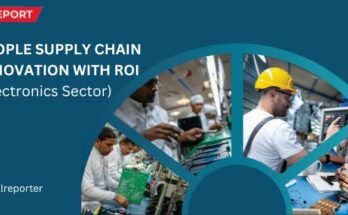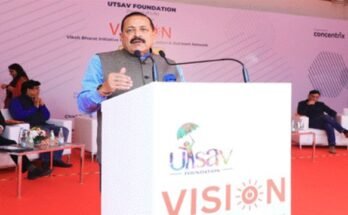Mumbai: Union Minister for Education and Skill Development & Entrepreneurship Shri Dharmendra Pradhan today addressed the special session with seafarers on the second day of the Global Maritime India Summit (GMIS), 2023 organized by the Ministry of Ports, Shipping and Waterways. As one of the biggest maritime summits in the world, it recorded a major investment of ₹2.37 lakh crore on the second day of the three-day summit held in Mumbai.
While addressing the event, Shri Pradhan commended the services rendered by the seafarers who support the maritime industry. They are the unsung heroes of the global economy, he commented. He highlighted that they support the global supply chain, are instrumental in facilitating trade, supporting tourism, safeguarding the nation’s water, and contributing to national development.
Shri Pradhan mentioned that India is a bright spot in the global economy and is supported by pillars like democracy, demography and diversity. India ranks fifth globally in the seafarers’ supply with nearly 2.5 lakh seafarers, consisting of 12% of its global community, he added. He also said the aim is to take it to 20%.
He emphasized that this is the first-ever techno-economic summit in which issues of human resource and capacity development are dealt with. He highlighted the decade-long effort of the Government in standardizing maritime training, increasing on-board training, improving examination and certification, and facilitating ease of doing business.
Shri Pradhan reminded how Odisha, since ancient times, remained an epicentre of glorious maritime traditions. While it is important to cherish the maritime heritage, it is also important to build on our maritime strength in laying the foundation of a new India, he emphasized.
He stated how the state had thriving maritime traditions, ship-building science and technology etc. that is depicted through the glorious tradition of Bali Jatra, which was also mentioned by Prime Minister Shri Narendra Modi, during the previous G20 Summit in Indonesia.
He expressed his gratitude to the Prime Minister for providing leadership in developing a robust skill-centric and industry-ready ecosystem. He mentioned the importance of NEP 2020 in bringing a massive transformation in the knowledge ecosystem by providing high-quality education and skills to all. Diverse challenges faced by the youth of the country will be skilled with the help of it that has introduced skills seamlessly in the transformative education system, he added. NEP 2020 will guide in skilling, re-skilling and up-skilling of the seafarers and make them future and industry-ready, he mentioned.
Shri Pradhan mentioned, equipping seafarers with future skills, standardisation and equivalence of skills and policy support to facilitate engagement of more Indian female seafarers is a priority of the government, led by Prime Minister Shri Narendra Modi.
He recognized the efforts of the Summit in serving as a platform to collaborate and create a better working environment as well as promote welfare, rights and recognition of seafarers, the backbone of shipping industry.
Earlier, on day one of the summit, Prime Minister Narendra Modi laid the foundation stones for 21 projects worth ₹18,800 crores. Prime Minister Shri Narendra Modi also launched Maritime Amrit Kaal Vision 2047 – a roadmap for maritime sector development for the next 25 years, the Amrit Kaal, to make India Atmanirbhar by 2047. At the roundtable on Global Economic Corridors, as many as 60 representatives from various countries attended, which included CEOs from 33 international companies and 17 Indian companies. The inaugural session also witnessed 10 ministers from different countries join the Union Minister Sarbananda Sonowal on the dais at the event. Twenty-one ministers from 10 countries participated in various sessions at the GMIS, in 2023.
The Summit’s focus is on key areas of the maritime sector with sessions and discussions around ports of the future; de-carbonization; coastal shipping & IWT; shipbuilding; repair and recycling; finance, insurance & arbitration; maritime clusters; innovation & technology; maritime safety and security; and maritime tourism, among others.



